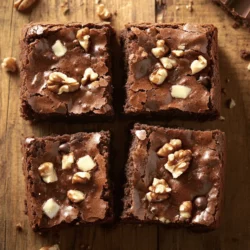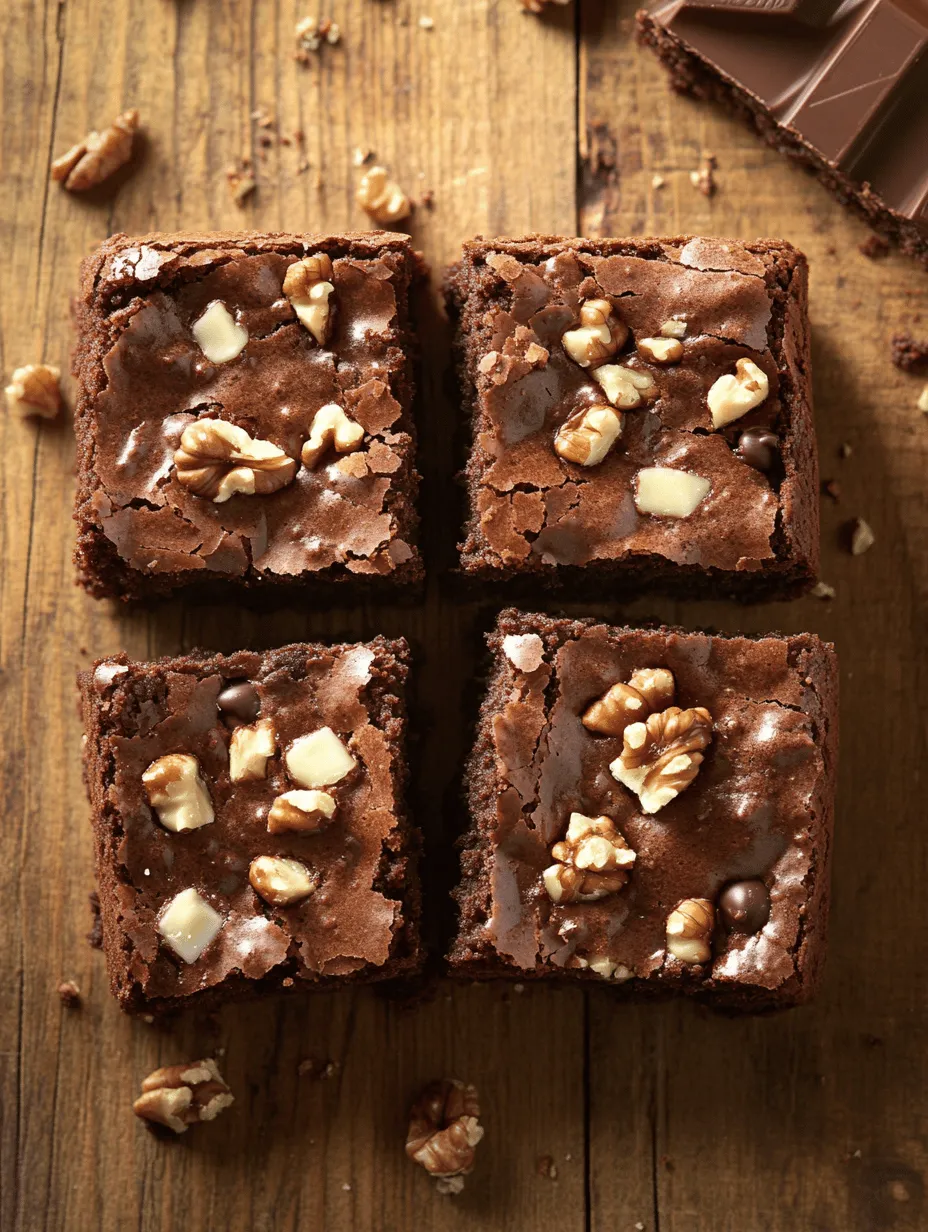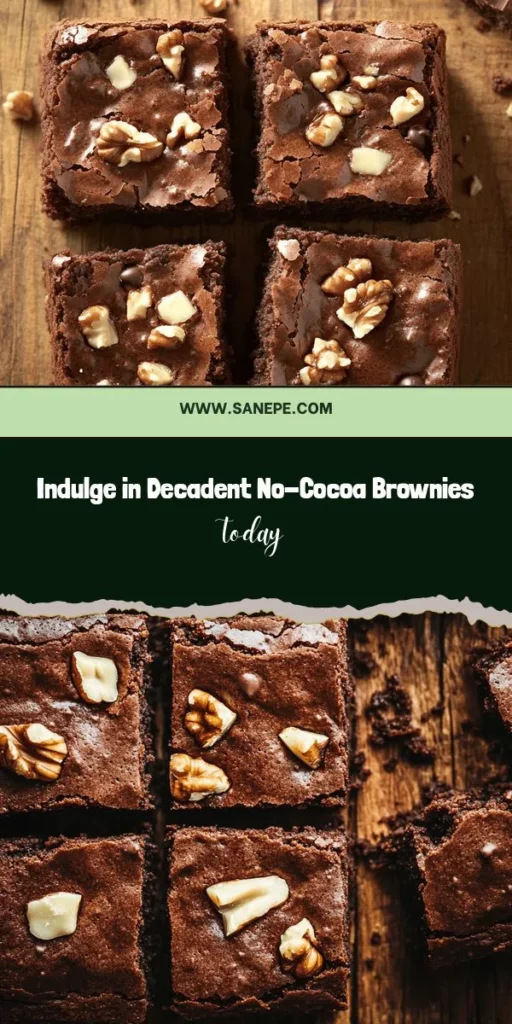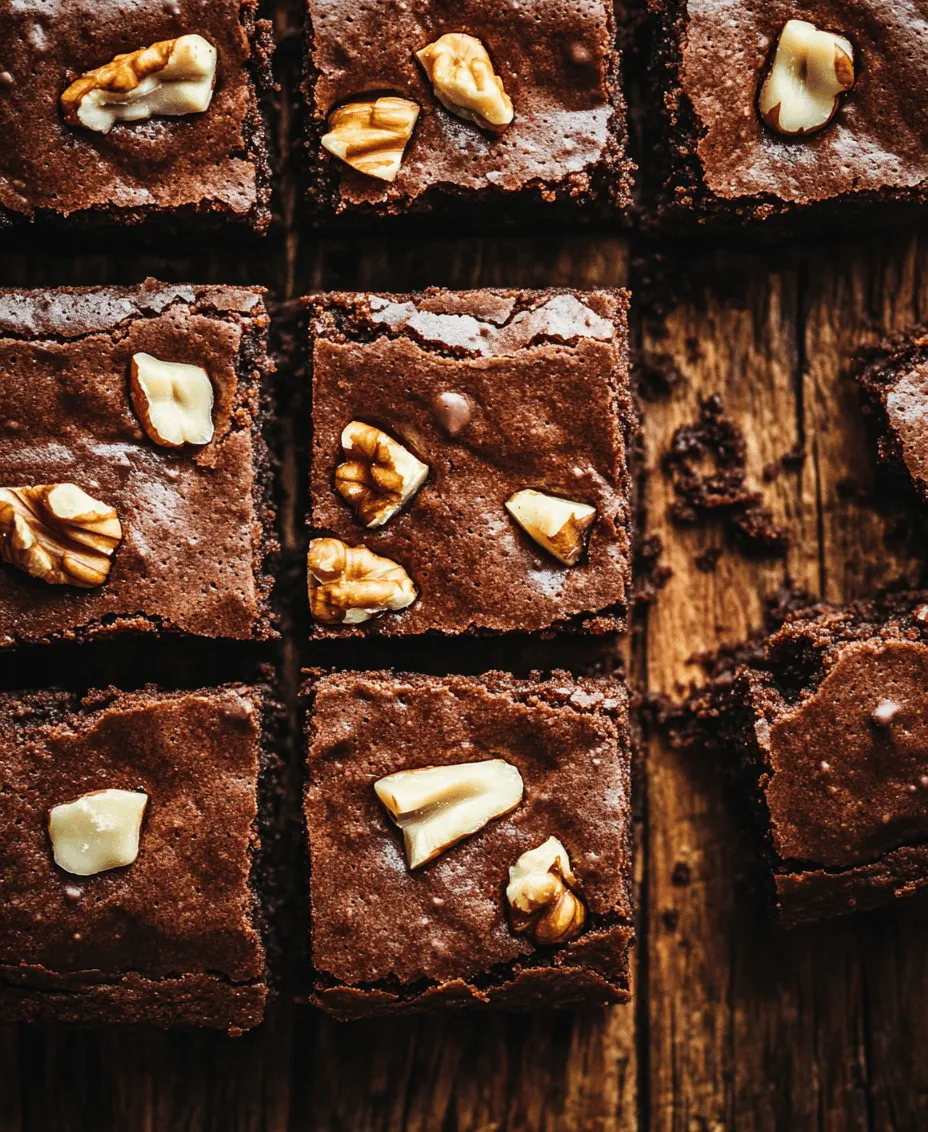Discover the ultimate indulgence with our Decadent No-Cocoa Brownies recipe. These rich, fudgy treats are perfect for chocolate lovers seeking an alternative to traditional cocoa-based brownies. With a delightful combination of brown sugar, butter, and a tantalizing mix of chocolate and nuts, these brownies promise to satisfy your sweet tooth without relying on cocoa powder. In this article, we will explore the allure of no-cocoa brownies, provide a step-by-step guide to making them, and delve into their unique flavor profile.
The Allure of No-Cocoa Brownies
At first glance, the concept of no-cocoa brownies might seem surprising to some. After all, brownies are typically associated with rich cocoa flavors that deliver that sought-after chocolate experience. However, no-cocoa brownies are a delightful twist on this classic dessert, offering an indulgent treat that is both unique and delicious.
The charm of no-cocoa brownies lies in their ability to provide a chewy and fudgy texture while relying on different flavors to create a delectable sweet treat. Instead of cocoa, these brownies draw upon brown sugar and butter to deliver a rich and satisfying dessert experience. The addition of chocolate chips enhances the chocolatey allure while allowing the other flavors to shine through.
The flavor profile of no-cocoa brownies is an exquisite blend of sweetness and nuttiness, often complemented by the use of various mix-ins such as nuts or chocolate chips. The result is a treat that is enticingly rich without being overwhelmingly chocolatey. This makes them an appealing option not only for chocolate enthusiasts but also for those who may be sensitive to cocoa or are simply looking for a delightful variation on the classic brownie.
Ingredients Overview
To achieve the perfect no-cocoa brownie, it’s essential to understand the role of each ingredient in the recipe. Here’s a detailed description of what you will need:
1. Unsalted Butter: Using unsalted butter is crucial for baking as it allows you to control the amount of salt in the recipe. Unsalted butter is also fresher and provides a clean flavor that enhances the taste of the brownies. The fat in the butter contributes to the rich texture and moisture of the brownies.
2. Brown Sugar: Brown sugar is the star ingredient that plays a vital role in achieving the right texture for your brownies. It contains molasses, which not only adds a deeper flavor but also retains moisture, resulting in fudgy and chewy brownies. The caramel notes of brown sugar beautifully complement the other ingredients.
3. Eggs: Eggs are fundamental to the structure of the brownies. They provide moisture and help bind the ingredients together, contributing to the overall texture. Eggs also help create a rich, dense consistency that is characteristic of fudgy brownies.
4. Almond Flour: One of the standout features of this recipe is the use of almond flour. This gluten-free alternative adds a unique flavor and texture to the brownies. Almond flour is not only lower in carbohydrates than regular flour, making it a great option for those watching their carb intake, but it also contributes healthy fats and protein.
5. Baking Powder and Salt: Baking powder is essential for providing lift to the brownies, ensuring they rise slightly while baking, resulting in a softer texture. A pinch of salt is equally important as it balances the sweetness of the brownies and enhances the overall flavor.
6. Chocolate Chips and Nuts: The addition of chocolate chips provides bursts of chocolatey goodness throughout the brownies, elevating their taste profile. Nuts, whether they be walnuts, pecans, or hazelnuts, add a delightful crunch and richness that complements the softness of the brownie.
By understanding the purpose of each ingredient, you can appreciate how they work together to create the ultimate no-cocoa brownie experience.
Step-by-Step Instructions to Perfect Brownies
Preheating the Oven: Setting the Stage for Baking
The first step in creating your Decadent No-Cocoa Brownies is to preheat your oven to 350°F (175°C). Preheating is an essential step in baking, as it ensures your brownies bake evenly and achieve the desired texture. An adequately heated oven will help the brownies rise and set properly, creating that perfect fudgy consistency.
Greasing the Pan: Tips for Easy Removal
While the oven is preheating, prepare your baking pan. Choose an 8-inch square baking dish for the ideal brownie size. Grease the bottom and sides of the pan with a thin layer of unsalted butter or cooking spray to prevent sticking. Alternatively, you can line the pan with parchment paper, leaving some overhang on the sides, which makes for easy removal once the brownies are baked. This simple step will save you from the frustration of trying to extract the brownies from the pan without breaking them.
Melting Butter and Mixing with Sugar: Creating the Base
Once your oven is preheated and your pan is prepared, it’s time to melt your unsalted butter. You can do this in a microwave-safe bowl or over low heat on the stovetop. If using the microwave, heat the butter in short intervals, stirring in between, until it’s completely melted but not bubbling.
Next, in a mixing bowl, combine the melted butter and brown sugar. Using a whisk or a spatula, mix them together until the mixture is well combined and creamy. This step is crucial as it helps to dissolve the sugar, creating a smooth base for your brownies. The warm butter will also help to melt some of the sugar, enhancing the overall flavor and texture of the brownies.
Incorporating Eggs and Vanilla: The Secret to Richness
The next step is to incorporate the eggs and vanilla extract into the mixture. Crack in two large eggs, and add one teaspoon of pure vanilla extract. Whisk the mixture vigorously until it is smooth and glossy, ensuring that the eggs are fully incorporated. The addition of vanilla not only enhances the sweetness of the brownies but also adds an aromatic quality that complements the rich flavors.
By following these initial steps, you are setting the stage for creating deliciously rich and fudgy no-cocoa brownies that will impress anyone who takes a bite. Stay tuned as we continue our journey through the rest of this decadent recipe!
Combining Dry Ingredients: Achieving the Right Consistency
To create the perfect base for your Decadent No-Cocoa Brownies, it’s essential to combine your dry ingredients correctly. This step not only ensures the brownies rise properly but also contributes to their overall texture and flavor. Start by measuring your almond flour, which serves as the primary ingredient, providing a nutty flavor and moist texture. In a large mixing bowl, add 1 cup of almond flour, 1/2 cup of coconut flour, and 1/4 teaspoon of sea salt.
Next, you’ll want to incorporate your leavening agent. Baking powder is a great choice here; use 1 teaspoon for optimal fluffiness. Whisk these dry ingredients together until well combined, ensuring there are no lumps. The goal is to create a uniform mixture that will blend seamlessly with your wet ingredients later on. At this stage, if you’re using any additional flavorings such as vanilla powder or spices like cinnamon, you can add them to the dry mixture for an even distribution of flavor.
Folding in Chocolate Chips and Nuts: Enhancing Flavor and Texture
Once your dry ingredients are combined and your wet ingredients are ready, it’s time to bring them together. Pour the wet mixture into the bowl of dry ingredients, then gently stir with a spatula or wooden spoon until just combined. Be careful not to overmix; you want to maintain a light and airy batter.
Next, enhance the flavor and texture by folding in 1/2 cup of chocolate chips and 1/2 cup of your choice of nuts, such as walnuts or pecans. The chocolate chips will add rich pockets of sweetness, while the nuts provide a satisfying crunch. If you’re looking for a nut-free option or have allergies to consider, feel free to substitute with seeds like sunflower or pumpkin seeds. Gently fold these ingredients into the batter until evenly distributed, ensuring that every bite is packed with delicious flavor.
Pouring and Spreading the Batter: Preparing for the Oven
Now that your batter is ready, it’s time to pour it into your prepared baking pan. Lightly grease an 8×8-inch or 9×9-inch square baking pan with coconut oil or line it with parchment paper for easy removal later. Carefully pour the brownie batter into the pan, using a spatula to scrape out every last bit.
With the batter in the pan, use the spatula to spread it evenly, smoothing the top. This step is crucial for even baking, as it allows the brownies to rise uniformly. Make sure to fill the corners and edges well, as these areas can sometimes bake faster than the center, leading to uneven textures.
Baking to Perfection: Knowing When They’re Done
Preheat your oven to 350°F (175°C) while you prepare the batter. Once your batter is spread evenly in the pan, place it in the preheated oven. Bake for 20-25 minutes, but keep a close eye on them as baking times can vary based on your oven and the pan you use.
To test for doneness, insert a toothpick into the center of the brownies. If it comes out with a few moist crumbs attached, they are ready. If the toothpick comes out clean, the brownies may be overbaked, so it’s best to check a little earlier than the recommended time. Remember, the brownies will continue to set as they cool, so it’s okay if they appear slightly underbaked.
Cooling and Cutting: The Final Touch
Once your brownies are perfectly baked, remove them from the oven and allow them to cool in the pan for about 10-15 minutes. This cooling period is essential for achieving the right texture, as it helps the brownies firm up. After they’ve cooled slightly, transfer them to a wire rack to cool completely.
Once cooled, it’s time to cut your brownies. Use a sharp knife to slice them into squares, wiping the knife clean after each cut for neat edges. Depending on your preference, you can make them as large or small as you like. For a more rustic look, feel free to cut them into irregular shapes.
Variations and Customizations
These Decadent No-Cocoa Brownies are incredibly versatile, allowing you to customize them based on your preferences and dietary needs. Here are several ideas:
– Nut Alternatives: If you or a loved one has nut allergies, consider using sunflower seeds or pumpkin seeds instead of traditional nuts. These options add a delightful crunch without the risk of allergens.
– Additional Flavorings: Explore adding flavors like orange or peppermint extract to the batter for a refreshing twist. You can also fold in dried fruits like cranberries or cherries for a burst of sweetness.
– Adjusting Sweetness: Depending on your taste preferences, you may want to adjust the sweetness level. If you prefer less sweetness, reduce the amount of honey or maple syrup by a couple of tablespoons.
– Seasonal Ingredients: Incorporate seasonal ingredients for a unique touch. For instance, during fall, consider adding pumpkin puree and spices like nutmeg and ginger for a seasonal delight.
Nutritional Insights
The nutritional profile of no-cocoa brownies differs significantly from traditional brownies. By using almond flour instead of all-purpose flour, you increase the protein content while reducing carbohydrates, making these brownies a more health-conscious option. Almond flour is rich in healthy fats and fiber, contributing to satiety and digestive health.
When comparing traditional brownies to no-cocoa versions, the latter typically contains fewer calories and carbohydrates, especially when using natural sweeteners like honey or maple syrup. The inclusion of nuts not only enhances flavor but also provides essential nutrients, including vitamin E, magnesium, and omega-3 fatty acids.
Serving Suggestions
Serving your Decadent No-Cocoa Brownies can elevate the experience and make them even more enjoyable. Here are some creative ideas:
– A La Mode: Serve warm brownies topped with a scoop of vanilla ice cream or whipped cream. The contrast of warm and cold creates a delightful texture and flavor combination.
– Brownie Sundaes: Use your brownies as a base for mini sundaes. Top them with your favorite ice cream, a drizzle of chocolate or caramel sauce, and a sprinkle of chopped nuts for an indulgent dessert.
– With Fresh Berries: Pair your brownies with fresh berries for a refreshing contrast. The tartness of raspberries or strawberries complements the sweetness of the brownies beautifully.
Conclusion
In conclusion, our Decadent No-Cocoa Brownies offer a delightful twist on a classic treat, providing an indulgent experience without the use of cocoa. With their rich flavor and satisfying texture, these brownies are sure to impress your family and friends. The recipe is simple yet versatile, allowing for various adaptations to suit your taste. Whether enjoyed on their own or dressed up for a special occasion, these brownies will bring joy to every bite. The next time you’re craving a sweet treat, consider this no-cocoa version that proves indulgence can come without the traditional chocolate, making it a unique addition to your dessert repertoire. Try this recipe today and discover how easy it is to create a delicious dessert that everyone will love!



